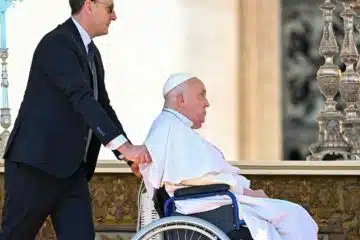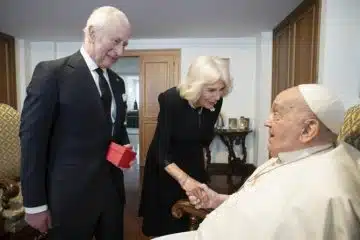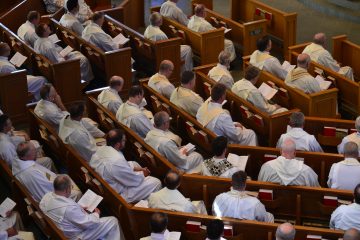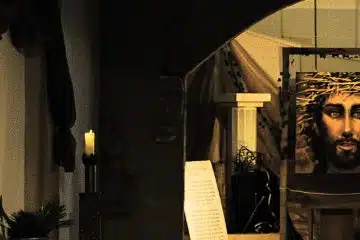Catholic bishops end refugee partnership with government amid Trump funding cuts
Washington, D.C. Newsroom, Apr 7, 2025 / 17:29 pm
The United States Conference of Catholic Bishops (USCCB) has made what it is calling the “difficult decision” to not renew cooperative agreements with the federal government amid policy changes from President Donald Trump’s administration to cut funding from refugee programs.
“While this marks a painful end to a life-sustaining partnership with our government that has spanned decades across administrations of both political parties, it offers every Catholic an opportunity to search our hearts for new ways to assist,” USCCB President Archbishop Timothy P. Broglio said in an April 7 statement.
The archbishop wrote that the funding cut “forces us to reconsider the best way to serve the needs of our brothers and sisters seeking safe harbor from violence and persecution.”
For about four and a half decades, the USCCB partnered with the federal government to provide services that help resettle refugees and support minors who entered the country without a parent or guardian or are separated from their families.
“All participants in these programs were welcomed by the U.S. government to come to the United States,” Broglio said. “These are displaced souls who see in America a place of dreams and hope.”
During the Biden administration, the federal government provided more than $100 million annually to the bishops, who redirected those funds to affiliated Catholic organizations that provided services. In recent years, the federal funding covered more than 95% of the expenses.
The Trump administration, which alleges that these programs strain both federal and local social services and facilitate unsustainable migration into the United States, has halted the entry of new refugees and ended federal support for programs that fund USCCB affiliates and other nongovernmental organizations that provide migrant and refugee services.
In February, the USCCB sued the administration over the funding freeze and laid off 50 employees due to the funding shortfall. Numerous Catholic organizations have also announced layoffs due to the administration’s cuts to both domestic and international programs.
Broglio said the USCCB “simply cannot sustain the work on our own at current levels or in current form.” He added that the bishops “will work to identify alternative means of support for the people the federal government has already admitted to these programs.”
“Our efforts were acts of pastoral care and charity, generously supported by the people of God when funds received from the government did not cover the full cost,” he added. “The Gospel’s call to do what we can for the least among us remains our guide. We ask you to join us in praying for God’s grace in finding new ways to bring hope where it is most needed.”
The archbishop noted that the USCCB, since its founding, “has been concerned with helping families who are fleeing war, violence, and oppression.” In 1920, he noted, it established a Bureau of Immigration to help displaced families find new opportunities in the United States.
“Many of us can trace our own parents, grandparents, or great-grandparents to these very families,” Broglio pointed out.
The USCCB president indicated that the organization “will continue advocating for policy reforms that provide orderly, secure immigration processes, ensuring the safety of everyone in our communities” and will “remain steadfast in our commitment to advocating on behalf of men, women, and children suffering the scourge of human trafficking.”
STATEMENT FROM ARCHBISHOP TIMOTHY P. BROGLIO:
WASHINGTON – Today, the U.S. Conference of Catholic Bishops (USCCB) announced its decision not to renew the cooperative agreements with the federal government related to children’s services and refugee support. Citing the government’s suspension of the cooperative agreements to resettle refugees, Archbishop Timothy P. Broglio, president of the USCCB explained how the government’s decisions have forced the Conference to reconsider the best way to serve the needs of those seeking safe harbor from violence and persecution.
From its very founding, the United States Conference of Catholic Bishops (USCCB) has been concerned with helping families who are fleeing war, violence, and oppression find safe and secure homes. What would eventually become the USCCB was founded in 1917 as the National Catholic War Council to support the war effort and care for Catholics in the military. In 1920, it established a Bureau of Immigration to help displaced families find new opportunities in the United States. Many of us can trace our own parents, grandparents, or great grandparents to these very families.
Over the years, partnerships with the federal government helped expand lifesaving programs, benefiting our sisters and brothers from many parts of the world. All participants in these programs were welcomed by the U.S. government to come to the United States and underwent rigorous screening before their arrival. These are displaced souls who see in America a place of dreams and hope. Some assisted American efforts abroad at their own risk and more seek a place to worship and pray safely as they know God calls them. Our efforts were acts of pastoral care and charity, generously supported by the people of God when funds received from the government did not cover the full cost.
Today, the USCCB makes the heartbreaking announcement that we will not be renewing existing cooperative agreements with the federal government related to children’s services and refugee support. This difficult decision follows the suspension by the government of our cooperative agreements to resettle refugees. The decision to reduce these programs drastically forces us to reconsider the best way to serve the needs of our brothers and sisters seeking safe harbor from violence and persecution.
As a national effort, we simply cannot sustain the work on our own at current levels or in current form. As USCCB cooperative agreements for refugee resettlement and children’s programs end, we will work to identify alternative means of support for the people the federal government has already admitted to these programs. We ask your prayers for the many staff and refugees impacted.
While this marks a painful end to a life-sustaining partnership with our government that has spanned decades across administrations of both political parties, it offers every Catholic an opportunity to search our hearts for new ways to assist. The USCCB will continue advocating for policy reforms that provide orderly, secure immigration processes, ensuring the safety of everyone in our communities. We remain steadfast in our commitment to advocating on behalf of men, women, and children suffering the scourge of human trafficking.
For half a century, we have been willing partners in implementing the government’s refugee resettlement program. The Gospel’s call to do what we can for the least among us remains our guide. We ask you to join us in praying for God’s grace in finding new ways to bring hope where it is most needed.














